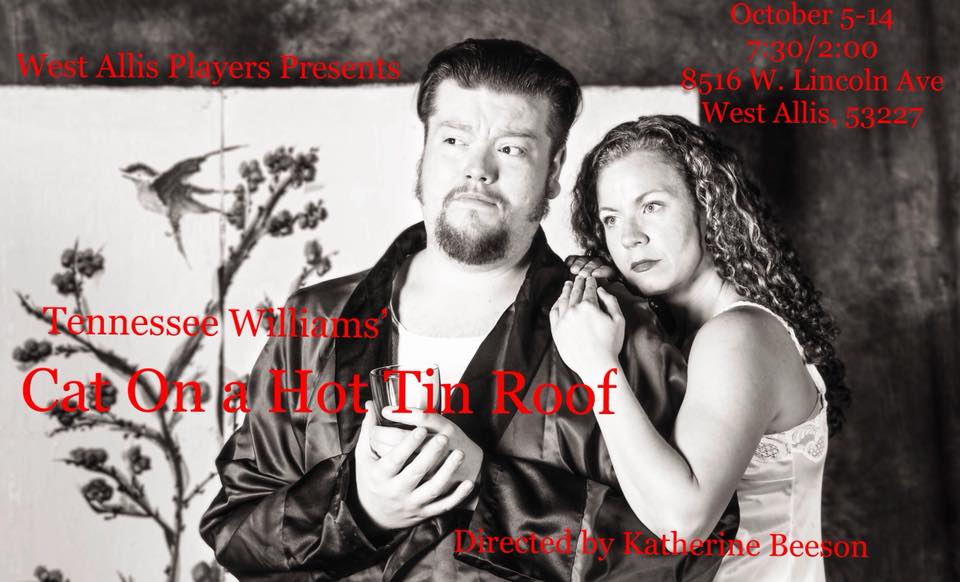|
The West Allis Players is one of those local community theatre groups that has been around forever. Next year they celebrate their 50th anniversary season. Granted, they haven’t been around as long as the Bay Players, but any theatre company that’s been around for more than a couple of decades in Milwaukee is kind of historic. After over a decade of covering theatre in Milwaukee, I finally had a chance to see a show with the venerable company. This month they are staging a production of Tennessee Williams’ A Cat on a Hot Tin Roof. Like so many other high school stages in town, the theatre at West Allis Central is huge and cavernous. Since a staging of a classic 20th century drama doesn’t exactly draw-in the kind of crowds it should, there’s plenty of space in the first few rows to make the stage seem relatively small. There’s a gentle hush of all those empty seats that really amplifies the loneliness of Williams’ classic drama. The play opens in that vast family estate in Mississippi. Nicholas Callan Haubner limps along on the crutch of Brick Pollitt. He’s big, silent and brooding. Avidalis Howard plays the shadow of his lover interest--Maggie the Cat. Howard treads delicately through Maggie’s restless southern lilt as she tries to engage in some sort of conversation with Brick. It’s been a while since I’ve seen a production of the drama. I’d forgotten just how much of the early drama weighs so heavily on Maggie. She’s delivering nearly ALL of the background and setting up nearly all of the drama and she’s doing it almost entirely by herself. Howard does a really good job of relaying the stresses of the lonely estate in a steady rhythm of a monologue that Maggie is really hoping to turn into a dialogue with the inert Brick. Haubner conscientiously leans through Brick’s brooding silences. There’s no attempt here to express too much in silence. In the early going, Haubner lets Brick come to rest into him onstage as Howard wields Maggie’s frustrations in speech, driving a solid line of expository thought through the drama’s opening scene. The dynamic between Haubner and Howard has a very organic, lived-in quality about it. She tenderly prods him in a direction of action in three long, slow scenes that migrate across the uncomfortably vastness of a stage made uncomfortably small by silence and shadow. Gene Schuldt has a gruff, casual intensity about him in the role of patriarch Big Daddy. Schuldt doesn’t command authority so much as allow it to be in the space he’s occupying. This approach serves the character quite well. Play the role with too much force or power and it undermines the more vulnerable side of a character who finds himself at the end of his life. The explosive anger that might other wise erupt out of Big Daddy in conversation with his son or his wife slides into the dialogue with a stern weariness. This allows for a sharply idiosyncratic relationship between himself and the silent mass of Haubner as Brick. There are some interesting things going on in and around the edges of the ensemble, but this production is at its best between Brick, Big Daddy and Maggie. And since so much of the drama rests on their interactions, this is a largely satisfying production. There are three acts. There’s an intermission between each act. The space around everything both physically and temporally allows the drama to settle-in with a slow rumble. That slow increase of pressure is something that Tennessee Williams mercilessly brilliant with. Director Katherine Beeson has done a respectable job of bringing Williams’ slow, steady tension to the stage. The West Allis Players’ production of A Cat on a Hot Tin Roof runs through Oct. 14 at West Allis Central High School on 8516 W. Lincoln Avenue. For ticket reservations and more, visit West Allis Players online.
0 Comments
Leave a Reply. |
Russ BickerstaffArchives
July 2024
Categories |

 RSS Feed
RSS Feed
